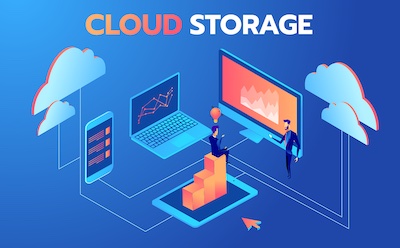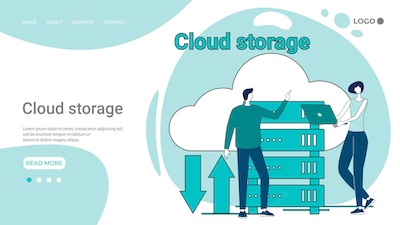 As more and more individuals and organizations move their data to the cloud, understanding and ensuring the security of this data becomes increasingly important. Cloud storage providers invest heavily in security measures to protect their users' data. However, it's crucial for users to have a clear understanding of these measures, as well as the potential risks and best practices to keep their data safe. In this article, we will explore the key aspects of cloud storage security, providing you with the knowledge needed to protect your data in the cloud effectively.
As more and more individuals and organizations move their data to the cloud, understanding and ensuring the security of this data becomes increasingly important. Cloud storage providers invest heavily in security measures to protect their users' data. However, it's crucial for users to have a clear understanding of these measures, as well as the potential risks and best practices to keep their data safe. In this article, we will explore the key aspects of cloud storage security, providing you with the knowledge needed to protect your data in the cloud effectively.
The Shared Responsibility Model
One of the fundamental concepts in cloud storage security is the shared responsibility model. This model implies that both the cloud storage provider and the user have responsibilities in ensuring the security of the data stored in the cloud. While the provider is responsible for securing the infrastructure and services, the user is responsible for securing the data itself, including access controls and encryption.
Understanding this shared responsibility model is essential because it highlights the need for users to take an active role in protecting their data, rather than relying solely on the cloud storage provider.
Key Security Measures Implemented by Cloud Storage Providers
To safeguard your data, cloud storage providers typically implement a range of security measures, including:
Physical Security
Cloud storage providers protect their data centers with various physical security measures, such as 24/7 surveillance, access controls, and security personnel. These measures ensure that only authorized individuals can access the servers where your data is stored, preventing unauthorized access or tampering.
Data Redundancy
Data redundancy involves storing multiple copies of your data across different geographic locations. This ensures that your data is protected from loss or damage due to hardware failure, natural disasters, or other unforeseen events. Most cloud storage providers offer data redundancy as a default feature, safeguarding your data from potential loss.
Data Encryption
Encryption is a critical security measure that involves converting your data into an unreadable format, rendering it useless to unauthorized individuals. Cloud storage providers typically encrypt your data both in transit (when it's being uploaded or downloaded) and at rest (when it's stored on the server). Encryption helps protect your data from unauthorized access, even if a malicious actor were to breach the server.
Access Controls
Access controls are mechanisms that allow you to manage who can access your data stored in the cloud. Cloud storage providers often offer various access control features, such as password protection, multi-factor authentication, and role-based access controls. By implementing access controls, you can limit unauthorized access to your data and track user activity.
Regular Security Updates
Cloud storage providers regularly update their systems and software to protect against newly discovered vulnerabilities and threats. These updates ensure that your data remains secure as new risks emerge.
Best Practices for Enhancing Cloud Storage Security
While cloud storage providers implement various security measures to protect your data, it's essential to take additional steps to enhance the security of your data in the cloud. Here are some best practices to follow:
Use Strong, Unique Passwords
Using strong, unique passwords for your cloud storage accounts is crucial in preventing unauthorized access. Ensure that your passwords are a combination of uppercase and lowercase letters, numbers, and special characters. Additionally, avoid using the same password for multiple accounts, as this could put your data at risk if one account is compromised.
Enable Multi-Factor Authentication
Multi-factor authentication (MFA) adds an extra layer of security by requiring users to provide two or more forms of identification before accessing your data. This can include a password, a unique code sent to your mobile device, or a fingerprint. By enabling MFA, you can significantly reduce the risk of unauthorized access to your data.
Regularly Monitor and Review Access Logs
Regularly monitoring and reviewing access logs can help you identify any unusual or suspicious activity in your cloud storage account. This allows you to detect potential security breaches and take appropriate action to mitigate the risks. Most cloud storage providers offer tools that enable you to view and analyze access logs, making it easier to monitor your account's security.
Educate Yourself and Your Team
Ensure that you and your team members understand the importance of cloud storage security and the best practices to follow. Provide training on topics such as password management, phishing attacks, and access controls to help your team members stay vigilant and protect your data.
Use Encryption for Sensitive Data
While cloud storage providers typically encrypt your data by default, you may want to consider using additional encryption for highly sensitive data. By encrypting your data before uploading it to the cloud, you add an extra layer of security that ensures only authorized individuals with the encryption key can access the information.
Regularly Back Up Your Data
Even though cloud storage providers offer data redundancy, it's still essential to maintain regular backups of your data. This ensures that you have a recent copy of your data in case of accidental deletion, data corruption, or other unforeseen events. By implementing a backup strategy, you can minimize potential data loss and ensure that your data is always accessible.
Evaluate Your Cloud Storage Provider's Security Measures
Before choosing a cloud storage provider, carefully evaluate their security measures and policies. Ensure that the provider meets your security requirements and complies with relevant industry standards and regulations. Don't hesitate to ask questions or request additional information about their security practices if needed.
Conclusion
Protecting your data in the cloud is essential for ensuring the security and privacy of your information. By understanding the shared responsibility model and the security measures implemented by cloud storage providers, you can make more informed decisions about how to secure your data. Additionally, following best practices such as using strong passwords, enabling multi-factor authentication, and regularly backing up your data can further enhance the security of your cloud storage. By taking an active role in protecting your data and staying informed about cloud storage security, you can enjoy the many benefits of cloud storage while minimizing the risks associated with storing your data in the cloud.














